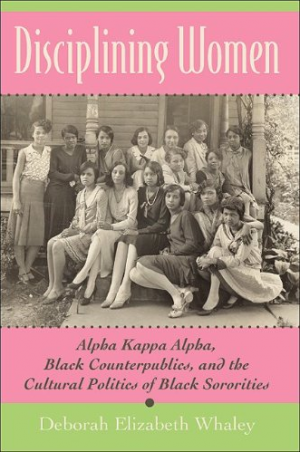Disciplining Women: Alpha Kappa Alpha, Black Counterpublics, and the Cultural Politics of Black Sororities

I learned a lot about Black Greek-letter organizations while reading Disciplining Women: Alpha Kappa Alpha, Black Counterpublics, and the Cultural Politics of Black Sororities, specifically about the title sorority, Alpha Kappa Alpha (AKA). The author, Deborah Elizabeth Whaley, does a good job of laying out the socio-political arena in which the members lived, from the importance of stepping to the brown paper bag (skin hue) test to the members’ activism in the public sphere.
Disciplining Women is split into five chapters and includes copious endnotes for the dedicated reader. Whaley introduces us to Black Greek-letter organizations (BGLOs) generally in the first chapter by referencing the recent movie Stomp the Yard and Spike Lee’s School Daze. She notes, however, that neither film is historically complex and both are about men’s organizations, not women’s, which creates kind of a vacancy in popular imagination about the specifics and importance of Black sororities. The first chapter is a stepping point from BGLOs by and large to AKA in particular.
The second chapter focuses on placing AKA and, by extension, other BGLOs into a historical context by connecting the sorority to other culturally significant events: everything from anti-lynching activism at the turn of the last century to1990s AIDS activism and all the way up to the present. Whaley duly notes AKA’s members’ good deeds but also mentions with caution that the sorority’s “politics of respectability and reform ventures” may actually have hurt (and continue to hurt) Black Americans as a whole. One step forward, two steps back, it seems.
The third chapter was the most interesting and informative to me because it covered stepping, something I’ve been interested in since I learned about it in college. (My school had no historically Black sororities or fraternities, but the Black Student Union often hosted groups from other schools, many of which included step performers.) Whaley briefly analyzes stepping by centering it in the step performances of the African diaspora and then centers on how stepping has evolved on college campuses and how young women reproduce and recreate gender, sexual identity, and ethnic loyalties through public ritual. Though other publications have covered stepping more thoroughly, Disciplining Women expands upon Black women’s contributions to discussions of femininity and sexuality.
In the fourth chapter, from which the title of the book is taken, Whaley tackles the minefield that is hazing in a BGLO (or any Greek-letter organization). The primary AKA case study about unofficial pledge activities that resulted in a criminal trial in Kent, Ohio, provided a dark, complicated look into sorority initiation rites.
In the last chapter, AKA sisters and alumnae comment on the future of BGLOs and raise three main points of concern: “class, gender, and racial struggle; regrets and mistakes pertaining to pledging and hazing; and maintaining hope through action in the Black public sphere.” Including the voices of women in AKA proved to be an important point for Whaley; she lets the reader draw his or her own conclusions by setting historical narrative and present-day socio-political and cultural discussion side by side for review.
Disciplining Women does not work well as an introduction to Black Greek-letter organizations and seems more easily approached as a case study of one such organization, Alpha Kappa Alpha, so long as the reader already has some background knowledge of Black fraternities and sororities, stepping, and/or hazing on college campuses. The reading is verbose and intense; more than once I had to reread a sentence to understand what it really meant. Essentially, it’s an academic text rather than a popular history or easy-to-read guide. Any one of the chapters could have been exponentially expanded and, when I was able to follow the author, I often wanted it to; the discussion, when I understood it, was all too brief for my taste. Disciplining Women provides a lot of great information, but make sure you’re prepared to focus and engage in the reading without interruptions or distractions.